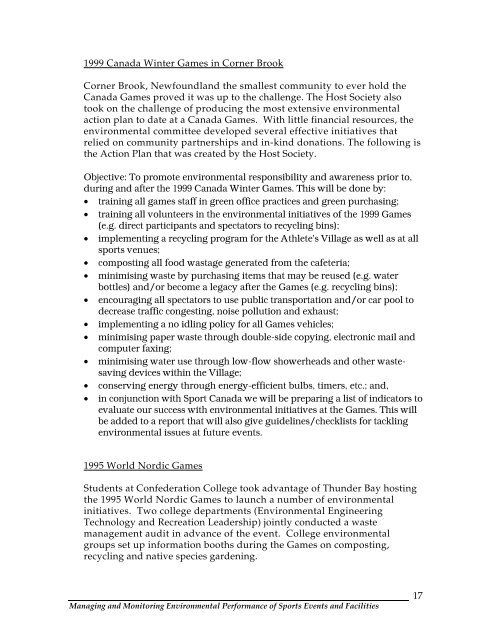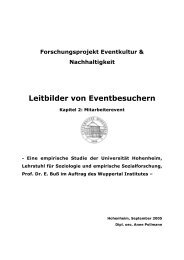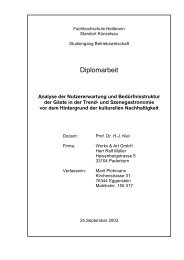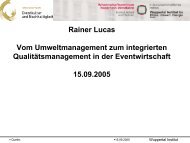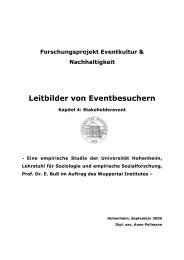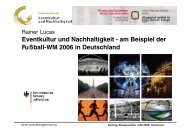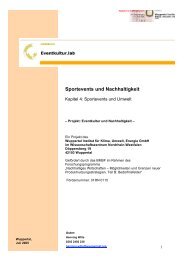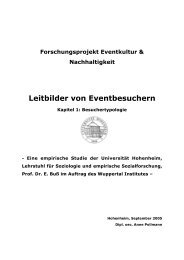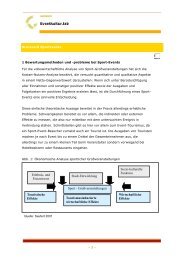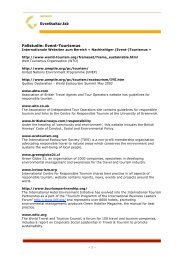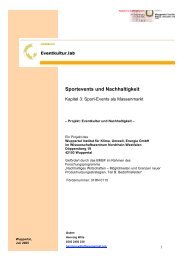environmental management and monitoring for ... - Eventkultur.lab
environmental management and monitoring for ... - Eventkultur.lab
environmental management and monitoring for ... - Eventkultur.lab
Create successful ePaper yourself
Turn your PDF publications into a flip-book with our unique Google optimized e-Paper software.
1999 Canada Winter Games in Corner Brook<br />
Corner Brook, Newfoundl<strong>and</strong> the smallest community to ever hold the<br />
Canada Games proved it was up to the challenge. The Host Society also<br />
took on the challenge of producing the most extensive <strong>environmental</strong><br />
action plan to date at a Canada Games. With little financial resources, the<br />
<strong>environmental</strong> committee developed several effective initiatives that<br />
relied on community partnerships <strong>and</strong> in-kind donations. The following is<br />
the Action Plan that was created by the Host Society.<br />
Objective: To promote <strong>environmental</strong> responsibility <strong>and</strong> awareness prior to,<br />
during <strong>and</strong> after the 1999 Canada Winter Games. This will be done by:<br />
• training all games staff in green office practices <strong>and</strong> green purchasing;<br />
• training all volunteers in the <strong>environmental</strong> initiatives of the 1999 Games<br />
(e.g. direct participants <strong>and</strong> spectators to recycling bins);<br />
• implementing a recycling program <strong>for</strong> the Athlete's Village as well as at all<br />
sports venues;<br />
• composting all food wastage generated from the cafeteria;<br />
• minimising waste by purchasing items that may be reused (e.g. water<br />
bottles) <strong>and</strong>/or become a legacy after the Games (e.g. recycling bins);<br />
• encouraging all spectators to use public transportation <strong>and</strong>/or car pool to<br />
decrease traffic congesting, noise pollution <strong>and</strong> exhaust;<br />
• implementing a no idling policy <strong>for</strong> all Games vehicles;<br />
• minimising paper waste through double-side copying, electronic mail <strong>and</strong><br />
computer faxing;<br />
• minimising water use through low-flow showerheads <strong>and</strong> other wastesaving<br />
devices within the Village;<br />
• conserving energy through energy-efficient bulbs, timers, etc.; <strong>and</strong>,<br />
• in conjunction with Sport Canada we will be preparing a list of indicators to<br />
evaluate our success with <strong>environmental</strong> initiatives at the Games. This will<br />
be added to a report that will also give guidelines/checklists <strong>for</strong> tackling<br />
<strong>environmental</strong> issues at future events.<br />
1995 World Nordic Games<br />
Students at Confederation College took advantage of Thunder Bay hosting<br />
the 1995 World Nordic Games to launch a number of <strong>environmental</strong><br />
initiatives. Two college departments (Environmental Engineering<br />
Technology <strong>and</strong> Recreation Leadership) jointly conducted a waste<br />
<strong>management</strong> audit in advance of the event. College <strong>environmental</strong><br />
groups set up in<strong>for</strong>mation booths during the Games on composting,<br />
recycling <strong>and</strong> native species gardening.<br />
Managing <strong>and</strong> Monitoring Environmental Per<strong>for</strong>mance of Sports Events <strong>and</strong> Facilities<br />
17


